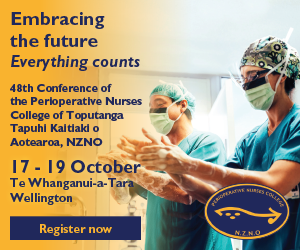Pockets of resistance to vaccination within nursing could be the result of mistrust built up against the male-dominated and hierarchal world of medicine, researcher Kate Hannah says.


Hannah spoke to Kai Tiaki Nursing New Zealand about viral misinformation as the Government launched COVID-19 vaccine mandates for almost all health professionals.
Hannah, principal investigator with research group Te Pūnaha Matatini, and project lead in The Disinformation Project, said a “large number” of New Zealanders believed in at least one or two pieces of misleading or false information.
Almost all nurses must receive their first vaccine dose by November 15; and be fully vaccinated by January 1. Some nurses oppose the mandate, despite being health-care professionals themselves.
Hannah said vaccine scepticism, or a cautious response to the COVID-19 mandate within nursing was not necessarily surprising when examined through a gender lens.
The mostly female nursing workforce was forced to navigate a complex male-dominated medical hierarchy, she said.
“A lot of nurses probably have quite complex relationships with their own profession, with the system that they’re part of and what that means.”
Thus, she said, it made sense that some nurses who were otherwise dedicated, caring and skilled, were uncertain about vaccination in general, and specifically the Pfizer vaccine.
There was a belief that people who were better educated or had more media literacy could better withstand misinformation, Hannah said.
“But we actually know, to be honest, the smarter you think you are, the more likely you are to come to a set of cognitive biases, where you started [by thinking] ‘you’re right’, so therefore you are right.”
People then sought only evidence that backed up their initial beliefs, she said.
“There’s a high likelihood there’s a little bit of that going on, alongside… these lived experiences of a complex set of interrelationships…”
Jagadish Thaker, senior lecturer in journalism and marketing at Massey University, said both the virus and misinformation can be fought with inoculation.
“One of the interesting research ideas that has emerged and applied during this pandemic is the idea of inoculation against misinformation,” he said. Exposure to weakened misinformation can help trigger “antibodies” so people can prevent infection, or spreading misinformation, when exposed to a much more persuasive misinformation piece.
“That is, knowing and experiencing the persuasive strategies of misinformation groups can pre-emptively help us identify such misinformation.”
It might seem people without higher education were most vulnerable to misinformation – but it wasn’t necessarily the case.
“Research in areas of science and health communication indicate that sometimes, our group identities – such as our political identity – takes over and even highly educated individuals can believe and spread misinformation, such as denying climate change or the need and effectiveness of COVID-19 vaccine.”
When it came to the COVID-19 pandemic, it appeared both the young and middle-aged harboured vaccine fears, he said.
More research was needed on why and how people in the health sector, “who pledge to do no harm”, were against getting a vaccine, Thaker said. “The better we understand their concerns, the better we can channelise information that they need.”
For some, getting a vaccine was as simple as getting a prescription from a trusted doctor. “But for some of us, it is a more complex decision-making process – we have trust issues, concerns about long-term safety, and the need to get a vaccine.”
Even before the vaccine mandate for health professionals was announced in October, the Nursing Council strongly recommended vaccination.
In July, it took a strong stance against anti-vaccination information in a media release.
While it “respected” nurses’ right to their own opinion, there was no place for anti-vaccination messages in professional health practice, it said. “Nor any promotion of anti-vaccination claims including on social media and advertising by health practitioners.”
Conversations with colleagues…

Ministry of Health workforce welfare lead with the COVID-19 vaccine and immunisation programme, Rachel Prebble, offers advice for tough conversations looming with colleagues.
COVID-19 has brought our personal and work selves together more than ever before. The vaccination mandate for health workers has created potential divisions between health professionals. How can we have respectful conversations with colleagues when there are differing views about vaccination?
Keep in mind we all want to keep our friends, whānau, colleagues and patients safe. A great starting point is to seek to understand different perspectives. As health professionals, we all comply with a wide range of health and safety and patient safety actions – what is it that makes this vaccination different?
This is a hard time for people who truly believe not getting vaccinated is the right thing to do. Let them know you value them as a member of the team and hope that they will choose to vaccinate so you can continue to work together.
People are most open to learning and change when they are calm, safe and trust the person talking to them. Ask the person who they would trust to talk to about their concerns.
Misinformation often relies on creating strong emotions – fear, anxiety or outrage to fuel the anti-vaccination movement. Be the antidote to that by creating a safe space for exploration and reflection.
It can be really frustrating to see and hear misinformation online or from a friend or colleague. Resist the temptation to argue to win the argument. Not only will it be less likely to be helpful but may affect your relationship and your own mental wellbeing.
You can’t change another person’s mind for them, only they can. Be kind, be respectful, offer to help by creating opportunities to access robust information – it may be just the nudge they need.
Sources of information on COVID-19:
Story updated since print issue.




